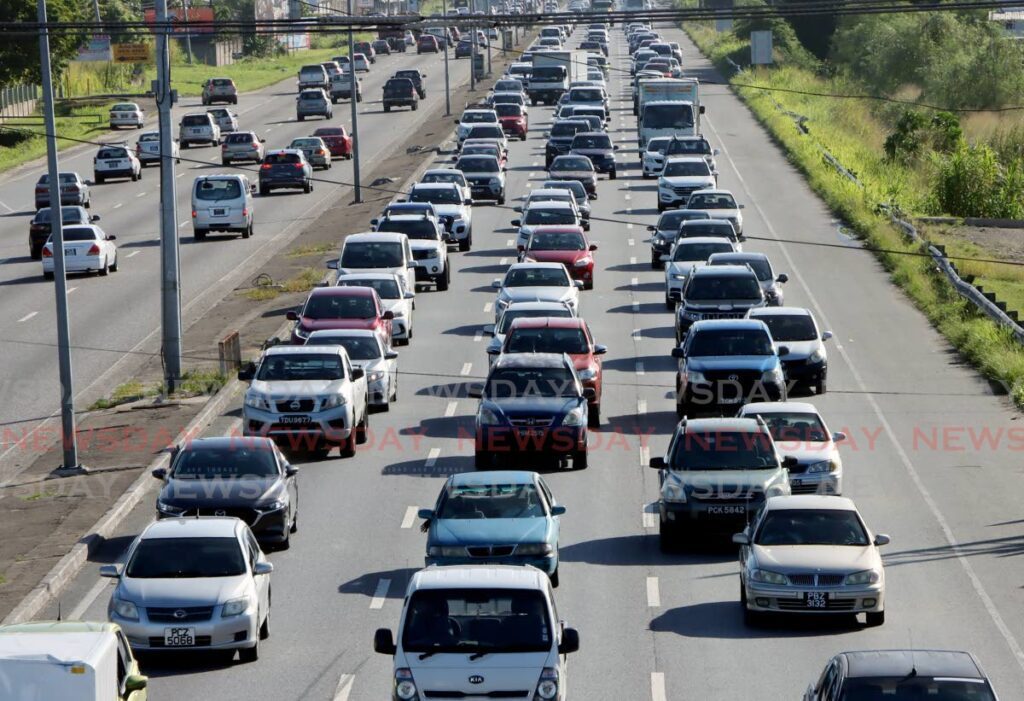Bringing relief to traffic woes

THE EDITOR: Trinidad's traffic woes are indeed severe, costing precious time and fuel and impacting the island's overall productivity. There isn't a single silver bullet, but a multi-pronged approach tackling various aspects could bring significant relief. Here are some key areas to focus on:
Enhance public transportation
Invest in rapid-rail system: A well-connected, efficient light rail or metro system could significantly reduce car dependence, especially for commutes between major cities and towns like Port of Spain, Chaguanas, Couva, San Fernando, Point Fortin, San Juan, St Augustine, Tunapuna, Tacarigua, Arima.
Improve bus network: Expand bus routes, increase frequency and prioritise dedicated bus lanes to make public transportation faster and more reliable. Consider modern, comfortable buses with accessible features.
Promote integration: Seamless integration between different modes of public transport, including buses, trains and ferries, is crucial for encouraging ridership. Easy ticketing and transfer systems can make it even more convenient.
Twelve-seater maxi taxis should be used as a feeder system from the communities and villages to the main transportation hubs. Twenty-four-seater maxis should operate the long-haul routes.
Manage existing traffic
Traffic management systems: Implement smart traffic-light systems that adapt to real-time traffic flow, reducing congestion at bottlenecks. Integrate technology for incident detection and response to minimise disruptions.
Improved road infrastructure: Address critical road repairs and maintenance promptly. Consider expanding highways in key areas while ensuring environmental considerations. Improve secondary roads to make them more efficient.
Parking management: Implement effective parking policies, including designated parking zones and pricing strategies, to discourage unnecessary car use in busy areas.
Encourage alternative transportation
Cycling infrastructure: Create safe and dedicated cycling lanes on major roads and in urban areas. Provide secure bike parking facilities and promote cycling as a healthy and sustainable alternative.
Walking initiatives: Make cities and towns more pedestrian-friendly with wider sidewalks, crosswalks and pedestrian-only zones. Encourage walking for short trips and errands.
Carpooling and ride-sharing: Promote carpooling incentives and facilitate ride-sharing platforms to reduce the number of vehicles on the road.
Long-term planning
Urban planning: Integrate transportation planning into broader urban development strategies to create mixed-use communities with reduced reliance on private vehicles.
Demand management strategies: Explore congestion pricing or tolls during peak hours to discourage unnecessary driving and generate revenue for infrastructure improvements.
Public awareness: Educate the public about the benefits of alternative transportation and the negative impacts of traffic congestion. Encourage a shift in mindset towards sustainable mobility.
Remember, implementing these suggestions takes time, resources and political will. However, a commitment to a comprehensive approach can significantly improve Trinidad's traffic situation, leading to a more efficient, productive and liveable island for everyone.
Decentralising government services could have a mixed impact on Trinidad's traffic problems. While it wouldn't directly address congestion, it could indirectly influence travel patterns and potentially contribute to a reduction in traffic, depending on the specific services transferred and how they are implemented.
Potential benefits
Reduced need for travel to centralised locations: If essential government services like licence renewals, permit applications and social security payments are made available through local offices or online platforms, residents in remote areas wouldn't need to travel long distances to Port of Spain or other major centres. This could decrease traffic on busy highways and in urban areas.
Improved local development: Decentralisation can stimulate economic activity and infrastructure development in rural areas, potentially creating more local jobs and amenities. This could reduce the need for residents to travel to urban centres for work or services, further alleviating traffic congestion.
Increased citizen engagement: Bringing government services closer to the people can foster a stronger sense of community and encourage citizen participation in local decision-making. This could lead to a more responsive and effective governance, potentially addressing local traffic concerns more effectively.
Potential drawbacks:
Inequitable access: Decentralisation can be challenging to implement equitably, especially in geographically dispersed or resource-constrained areas. Ensuring adequate funding, personnel and technology for all local service centres is crucial to prevent disparities in service quality and accessibility.
Bureaucracy and inefficiency: If not carefully managed, decentralisation can lead to duplication of services and increased bureaucracy, potentially negating any traffic reduction benefits. Streamlining processes and ensuring clear communication between central and local authorities are essential.
Limited impact on core commuting: While decentralising some services can reduce specific trips, it might not significantly impact the core traffic issues arising from commuting patterns, job locations and urban sprawl. Addressing these factors requires additional measures like improved public transportation and land-use planning.
Overall, decentralising government services can be a valuable tool for improving overall governance and local development in Trinidad. However, its impact on traffic congestion is likely to be indirect and depends on careful planning and implementation.
STEPHEN SHEPPARD
via e-mail


Comments
"Bringing relief to traffic woes"